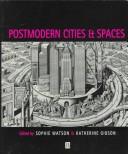| Listing 1 - 5 of 5 |
Sort by
|

ISBN: 0631194045 0631194037 9780631194040 Year: 1996 Publisher: Oxford: Blackwell,
Abstract | Keywords | Export | Availability | Bookmark
 Loading...
Loading...Choose an application
- Reference Manager
- EndNote
- RefWorks (Direct export to RefWorks)
Postmodernité --- --Cities and towns --- Postmodernism --- Sociology, Urban --- Social aspects --- Cities and towns. --- Sociology, Urban. --- Social aspects. --- Sociology of environment --- Economic geography --- anno 1900-1999 --- Cities and towns --- Urban sociology --- Global cities --- Municipalities --- Towns --- Urban areas --- Urban systems --- Human settlements --- Villes --- Postmodernisme --- Sociologie urbaine --- Aspect social --- 711.4 --- Stedenbouw (theorie) --- Postmodernism - Social aspects
Article
Abstract | Keywords | Export | Availability | Bookmark
 Loading...
Loading...Choose an application
- Reference Manager
- EndNote
- RefWorks (Direct export to RefWorks)
POSTSTRUCTURALISME --- ECONOMIES DIVERSES --- SUBJECTIVITE --- REPRESENTATION --- MICROPOLITIQUES
Book
ISBN: 0988234068 9780988234062 Year: 2015 Publisher: Brooklyn, NY punctum books
Abstract | Keywords | Export | Availability | Bookmark
 Loading...
Loading...Choose an application
- Reference Manager
- EndNote
- RefWorks (Direct export to RefWorks)
The recent 10,000 year history of climatic stability on Earth that enabled the rise of agriculture and domestication, the growth of cities, numerous technological revolutions, and the emergence of modernity is now over. We accept that in the latest phase of this era, modernity is unmaking the stability that enabled its emergence. But we are deeply worried that current responses to this challeng are focused on market-driven solutions and thus have the potential to further endanger our collective commons. Today public debate is polarized. On one hand we are confronted with the immobilizing effects of knowing "the facts" about climate change. On the other we see a powerful will to ignorance and the effects of a pernicious collaboration between climate change skeptics and industry stakeholders. Clearly, to us, the current crisis calls for new ways of thinking and producing knowledge. Our collective inclination has been to go on in an experimental and exploratory mode, in which we refuse to foreclose on options or jump too quickly to "solutions." In this spirit we feel the need to acknowledge the tragedy of anthropogenic climate change. It is important to tap into the emotional richness of grief about extinction and loss without getting stuck on the "blame game." Our research must allow for the expression of grief and mourning for what has been and is daily being lost. But it is important to adopt a reparative rather than a purely critical stance toward knowing. Might it be possible to welcome the pain of "knowing" if it led to different ways of working with non-human others, recognizing a confluence of desire across the human/non-human divide and the vital rhythms that animate the world? We think that we can work against singular and global representations of "the problem" in the face of which any small, multiple, place-based action is rendered hopeless. We can choose to read for difference rather than dominance; think connectivity rather than hyper-separation; look for multiplicity -- multiple climate changes, multiple ways of living with earth others. We can find ways forward in what is already being done in the here and now; attend to the performative effects of any analysis; tell stories in a hopeful and open way -- allowing for the possibility that life is dormant rather than dead. We can use our critical capacities to recover our rich traditions of counter-culture and theorize them outside the mainstream/alternative binary. All these ways of thinking and researching give rise to new strategies for going forward.
Sustainability. --- Human ecology. --- Nature --- Effect of human beings on. --- anthropocene --- ecology --- environmental humanities --- climate change --- Anthropogenic effects on nature --- Ecological footprint --- Human beings --- Anthropogenic soils --- Human ecology --- Ecology --- Environment, Human --- Human environment --- Ecological engineering --- Human geography --- Sustainability science --- Social ecology --- Social aspects --- Effect of environment on --- Effect of human beings on
Book

ISBN: 9783868595222 Year: 2018 Publisher: Berlin Jovis Verlag GmbH
Abstract | Keywords | Export | Availability | Bookmark
 Loading...
Loading...Choose an application
- Reference Manager
- EndNote
- RefWorks (Direct export to RefWorks)
Environmental planning --- urban planning --- community development --- urban renewal --- Džokić, Ana --- Neelen, Marc --- STEALTH.unlimited
Book

ISBN: 9782956303237 Year: 2018 Publisher: Parijs : Lafayette Anticipations,
Abstract | Keywords | Export | Availability | Bookmark
 Loading...
Loading...Choose an application
- Reference Manager
- EndNote
- RefWorks (Direct export to RefWorks)
Duncan, Kenny ; Jaque, Andrés ; Hamadeh, rana ; Maheke, Paul ; Dean, danielle ; Andriessen, Isabelle ; Beech, Lucy ; Chabanon, Eve ; Cooking Sections ; Jumana, Manna ; Patterson, Yuri
| Listing 1 - 5 of 5 |
Sort by
|

 Search
Search Feedback
Feedback About UniCat
About UniCat  Help
Help News
News